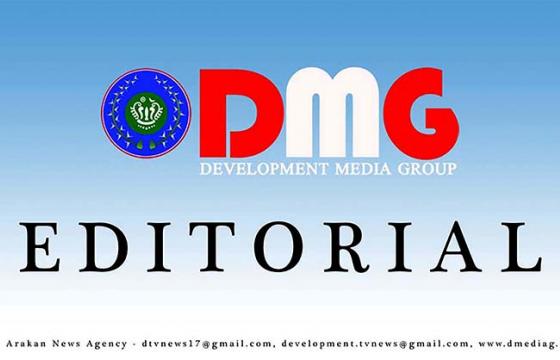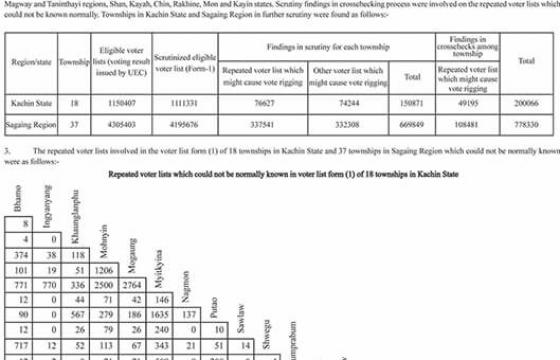When the Commander-in-Chief Min Aung Hlaing declared quite recently that he was toeing the line of Aung San Suu Kyi’s 21st Century Panglong initiative, it looks like that the military, also known as Burma Army or Tatmadaw, is ready to take order from the National League for Democracy (NLD)-led regime and would help facilitate its national reconciliation and all-inclusiveness policy.
But as he was uttering such affirmative words, elsewhere in northern Shan State and Kachin State, Hpakant areas, military offensives were being conducted against the Shan State Progress Party/Shan State Army (SSPP/SSA) and Kachin Independence Organization/Army (KIO/KIA), in the name of defending the constitution and the country’s sovereignty.
This “doublespeak” of Min Aung Hlaing is quite troubling to the majority of the people and concerned stakeholders, for this indicates more war and less peace, which is just contrary to the aim and object of achieving a workable national reconciliation as a priority.
Let us examine some of the facts emerging during this few days that have hit the headlines.
Commander-in-Chief response to Suu Kyi’s initiative
Suu Kyi’s 21st Century Panglong Convention to be called within one or two months that is supposed to be all-inclusive, albeit the real emphasises is “all those that deserve and ought to participate,” whatever it really is meant, the details are still scant on how she is going to lead and structure the whole process.
On 13 May, Min Aung Hlaing endorsing the peace initiative said when meeting with media at Bayintnaung Yeiktha in Naypyitaw: “I want eternal peace. That’s what I said to Daw Aung San Suu Kyi. We’ll make efforts to achieve peace in this five year term.”
“The door is open to those who wish to sign the peace agreement. I’ve been saying so from time to time. We’re treading on the democratic path,” stressed the Senior General regarding the attitude of the Tatmadaw towards peace, according to The Global New Light of Myanmar.
“If we don’t protect the administrative machinery, we will be, I’m sure, in great trouble. We protect Our Three Main National Causes. We protect the lives and property of the people. If an institution of the administration is attacked, we cannot stay aloof with our arms folded,” he added.
Perhaps to dispel the lingering doubts and stigma of being “a state within a state”, Min Aung Hlaing took the opportunity in his meeting with the media, together with his active military officers, who are from Defence Ministry, Commander-in-Chief Office and coordinating commander of the Infantry, Navy and Air Force, and told the journalists that he seek approval of the President U Htin Kyaw in all important matters and that he is subordinate to the presidency.
Wars on Ethnic Armed Organizations (EAOs)
Regardless of such posturing, the coordinated military offensives that were conducted and still are ongoing in Arakan, Shan and Kachin States against the Arakan Army (AA), SSPP/SSA and KIO/KIA, in addition to the Burma Army’s on and off offensives against the Kokang or Myanmar National Democratic Alliance Army (MNDAA) and Ta’ang National Liberation Army (TNLA), while a war-footing posture with the United Wa State Army (UWSA) is maintained, it is not clear if it has the real official government’s backing or not.
On 12 May, Myawaddy news, the military’s mouthpiece, said that from 1 to 10 May, there were 13 armed engagements between the Burma Army and KIA, where the Kachin suffered one killed, while several of the government troops were wounded.
On same day, the RFA aired an interview with Mr. Daung Khar, head of the KIO’s technical team regarding the armed clashes with the Burma Army whether they were just sporadic artillery fires or just accidental ones, replied that they were well coordinated, large scale offensives and the KIA have withdrawn from a number of outposts, due to the heavy onslaught.
When asked about the joint-monitoring committee between the KIO and Burma Army to de-escalate the armed conflict of whether it still existed, he replied that so far as his organization is concerned it is still there although there have been no meeting, whatsoever, and no making use of the mechanism during the tenure of the new regime so far.
He was so upset with the situation, when the KIA had to withdraw some of its troops’ garrisoned in 6th Battalion area, a recent news report has quoted him as saying that the KIO will not talk to either the military on armed conflict or politics with the new regime.
The Voice of 13 May reports: “Since our 6th Battalion withdrawal, (we) don’t want to talk about politics and military any more. Peace is not so easy (to achieve),” complained Daung Khar.
In the mean time, the Burma Army has been pressuring the SSPP/SSA to withdraw from positions of Loi Hsur-Loi Leng mountain ridge in Tangyan Township, bordering the UWSA and simultaneously conducting military offensives around Kyaukme Township in SSPP/SSA controlled areas.
SHAN and VOA reports on 14 May said Burma Army offensives were launched on 3, 6 and from 12 to 14 May against the SSPP/SSA units in Kyaukme, northern Shan State. The SSA was said to have suffered 3 killed, while the Burma Army lost 15 of its troops, in addition to another 3 officers.
The Burma Army offensives on 13 May was said to include repeated air attacks with three MI 35 helicopters.
The coordinated attacks come after the seemingly satisfied joint-inspection demand of the Loi Hsur-Loi Leng mountain ridge by the military, where the SSA have its troops stationed, following the SSA’s refusal to withdraw from the outposts, it was instead agreed to inspect and verify that it has not built any massive defence parameters.
NLD’s political moves and the military’s strategic actions
It is quite clear that the EAOs, including the 12 ethnic political parties of United Nationalities Alliance (UNA) are disappointed with the NLD regime.
The non-signatory United Nationalities Federal Council (UNFC) camp are for the moment in “wait-and-see” mode on what the NLD will do with the peace process, while the Karen National Union (KNU) that has signed the Nationwide Ceasefire Agreement (NCA) openly was critical of the NLD’s 21st Panglong Convention call, stating that it would be meaningless unless all-inclusiveness – meaning: the AA, MNDAA and TNLA should be on board – is accepted and implemented first and foremost. Adding that the former President Thein Sein’s peace process should be continued.
KNU Chairman Mutu Say Poe met the ex-President and Commander-in-Chief on 15 May, stating however that it was just a form of nurturing the good relationship that has existed and developed during the last few years, according to Mahn Nyein Maung, a Central Committee member and close aide of Mutu Say Poe.
As for the UNA, the broken power-sharing pledges between the ethnic parties and the NLD became apparent, plus leaving them out in the cold and treating them as insignificant in power equation, prompted Hkun Htun Oo, the Shan Nationalities League for Democracy (SNLD) Chairman and also that of the UNA, to say that the ethnic have to rely on themselves and no more on the NLD very recently.
The NLD had appointed its party’s Chief Ministers in Arakan and Shan States, amid repeated pleas to let the Arakan National Party (ANP) and SNLD occupy the positions, forming state coalition governments with the NLD respectively. The NLD is seen as selectively making use of the military-drawn constitution to suits its agenda and taking advantage to appoint the Chief Ministers, when it has all along labelled the constitution undemocratic and not federal, struggling for the amendment or even soliciting to rewrite it, so that it will be federal and democratic. In short, the ethnic camp has taken the NLD as going against its own democratic principles.
U Aye Thar Aung, a well known Arakan politician, who Suu Kyi has appointed 3rd Union (Lower House) and 2nd National (Upper House) Deputy House Speaker was also even sounding critical on the big picture, ethnic nationalities’ political aspiration of “genuine federalism”, when he said during the recent meeting of UNA: “It’ll be hard to achieve the kind of federal union that we envisage, but we can’t just be disappointed and let go, but have to keep on trying.”
The general assumption of the Union Solidarity and Development Party (USDP)-Military clique is to create a situation that it would continue to have political edge and the NLD’s position is in the limbo, from wooing its military adversaries to cooperate, drive a wedge and facilitate the fence-sitters to jump to its side, and among others, to forsake its election campaign promises and build an alliance of real grand-coalition in words and deeds with the military, understandably at the expense of the ethnic nationalities.
Regarding the military clique deliberation in trying to have the continued political advantage that it has enjoyed for so many years is the key concern. Seasoned observers and stakeholders are of the opinion that it has employed two strategic moves. One is the stoking of religious conflict, camouflaged by angst of Islamophobia and interpretation of Burmeseness or ethnocentric narrow nationalism; and the other, keeping the war flames in ethnic areas burning so that the military will have a say in political decision-making process, which has always been the case so far.
KIO Chief technical advisor, Daung Khar pointed out in his recent RFA interview that Kachin and Arakan States are prime targeted areas where the military is keen to keep the armed conflict alive, so that the importance of the military and political clout could be maintained. Now it seems, Shan State is also going to be part of its prime targeted areas.
Regarding the employment of the religious conflict to create trouble for the NLD, the seasoned Burma observers concluded, during the recent Sunday discussion program in RFA, that this has been the real disturbing fact and that the NLD should have full awareness of such potential challenges, which could even unseat the newly installed civilian regime.
Out look and perspective
Adding to this angling for a political edge by the two major stakeholders are the escalation of the Restoration Council of Shan State/Shan State Army (RCSS/SSA), a signatory of the NCA, and TNLA armed conflict with other EAOs entering the fray from the latter’s side, coupled with the Tatmadaw offensives and counter-offensives of the EAOs in Kachin and Shan States, which are not at all helpful to the ongoing peace process.
Of course, no one knows for sure, how the political manoeuvring of the two Bamar main actors will unfold. But all could be sure that each will continue to angle on how to out do the other, even as both continue to posture themselves as working for the betterment of the country, people and national reconciliation.
As for the Suu Kyi and NLD’s possible move, no one will be able to predict with precision which of the mentioned hypothetical supposition will be chosen to further its party’s objectives. Only the gradually unfolding political moves of the NLD would answer the question.
Meanwhile, Min Aung Hlaing’s doublespeak of achieving total lasting peace within five years and the parallel, heightened, ongoing military offensives in ethnic areas will continue to weigh heavily on the ethnic nationalities as a whole.





